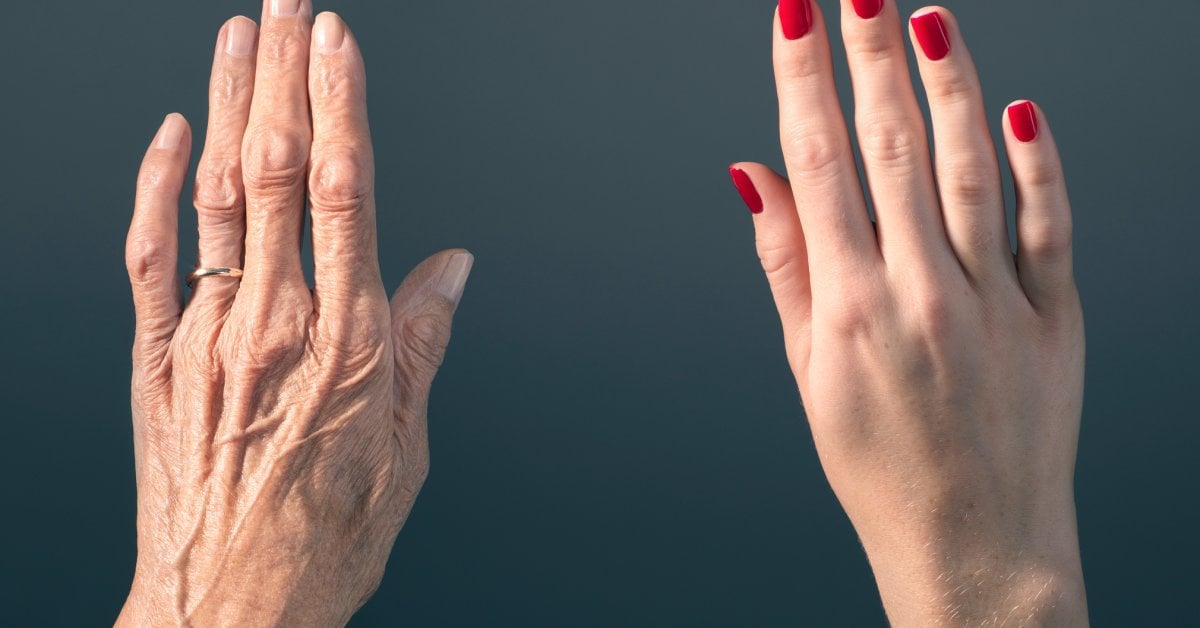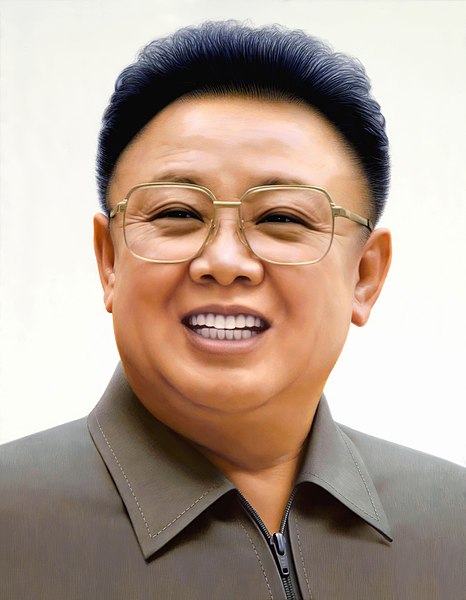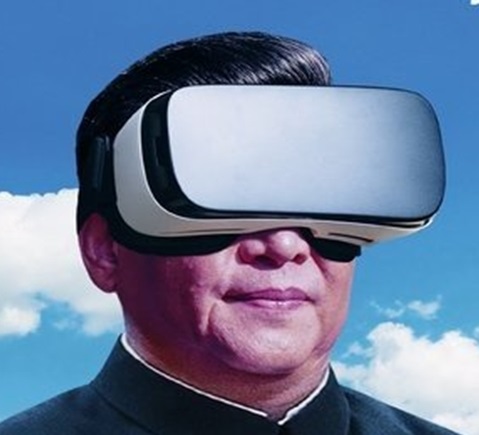One guy said maybe the rich will worry about climate change now that they will live long enough, lmao.
Some of these motherfuckers are getting so old that it makes me scared they’ve already found it, siphoning blood from the youth or eating fetuses or whatever demonic shit they’re doing. Henry Kissinger is 99 years old and still won’t shut his fucking mouth. George H.W. lived to 94. Biden’s 80 but everybody’s content acting like it isn’t fucking strange that we live in a geriatocracy with living corpses ruling us.
Don’t let em live longer. Begging the cosmos that immortality is impossible so we don’t have to suffer these ghouls for longer than naturally possible. (Plus we wouldn’t get to use the crab emoji nearly as often 🦀)
I suspect it has to with a number of factors:
-
access to premium healthcare on demand
-
lack of physical labor
-
lack of much labor in general, I sincerely doubt these fucks have to work even as much as your average white collar office drone does
Office workers still have to work as much as many others, it’s just not physically demanding. AFAICT, the bourgeoisie’s “labour” seems to basically just consist of participating in meetings
I’ve worked as a carpenter, I worked in a steel factory and I am now doing an office job. An office job is tiring on so many different levels. Plus you sit all day which completely sucks ass.
Not that the other two jobs were easy but at least I got some physical training at the same time.
Edit: after reading the original comment again I understood that it was not comment on office work vs physical labor but instead capitalist ghoul vs office worker
-
easiest way to stop capitalists from aging is to make them be not alive
Reversing aging and trying to stop death is dumb. It’s probably impossible, and certainly individualistic. I believe it was Mao who said, toward the end of his life, something along the lines of “just as the true communist willingly sacrifices himself for the good of the people, so the older generation accepts death for the sake of the new generation.”
LATE EDIT: can’t find the specific Mao quote I was thinking of (I may be misremembering), but here’s something similar, from his speech to the 8th Party Congress:
The Chinese people consider weddings as red happy events and funerals white happy events. I find them very rational. The Chinese know dialectics. Weddings will produce children. A child is split out of the body of the mother. It is a sudden change, a happy event. One individual is split into two or three, or even 10, like the aircraft carrier.
The common people find the deaths, changes and occurrences of new matters happy events. When a person dies, a memorial meeting is held. While the bereaved weep in mourning, they feel it is also a happy event. Actually, it is. Just imagine if Confucius were still living and here at this meeting in Huai-jen Hall, he would be over 2,000 years old and it wouldn’t be so good! If one subscribes to dialectics and yet disapproves of death, it will be metaphysics. Disasters are social phenomena, natural phenomena. Sudden changes are the most fundamental law of the universe. Birth is a sudden change; so is death. In the several decades from birth to death, it is a gradual change. If Chiang Kai-shek should die, we would clap our hands in joy. If Dulles should die, none of us would shed a tear. This is because the death of matters of the old society is a good thing, hoped for by everyone.
I think this is a very fatalistic way of thinking. Reversing aging and stalling or avoiding death will be very likely in the coming decades. It should benefit everyone, not just the bourgeoisie.
The entirety of our planet’s ecology is predicated upon death. I’d be incredibly wary of introducing immortality into the mix, regardless of which political system was administering it at any given time.
Furthermore – and this to my mind would be the single biggest problem with immortality (a concept I still think is a pipe dream) – most people’s and ideas and worldview tend to crystallize at a certain point, and never really change after that. Death and the emergence of a new generation are a natural check; each new generation realizes in a different manner some facet of what it means to be human. With immortality, we would likely see stagnation, with the world run by people whose ideas matched material reality three or four hundred years ago. Think of tradition in the very worst sense, as a “dead weight” which current humanity is trapped under; and now imagine that tradition still living and enforced by the actual people who created it.
To me, that line from How the Steel Was Tempered is the complete expression of communist morality and a truly human attitude toward death: “The most precious thing a man possesses is his life. It is given once, and never given again. And it should be spent so that in dying, one can say: I gave it all, my whole life, my whole strength, for the greatest thing that there is – the fight for the liberation of humanity.”
i think there’s a deep, deep irony in simultaneously bringing up how immortality (the resolution of the contradiction of aging, or the survival aspect of living) would create more intense contradictions regarding the ability of societies to adapt to material conditions, while using quotes from people who are long dead and lived in wildly different material conditions to uphold a seemingly metaphysical “communist morality.” mao was not a prophet, he was a leader of a largely agrarian and peasant society who did the most for his society that could be done with the tools that he had. with new tools comes new standards for what can be done to improve the quality of life of society. do you really think confucius would be the exact same after 2000 years?
treatment of aging would be an incredibly efficient, cheap, and easy way to treat all the diseases that are symptoms of aging, and that cause pain and suffering around the world. if we also assume that a longer lifespan means the accumulation of more experiences, more education, and more wisdom, then an older but healthy populace would produce more value for less time and have the ability to lead richer, fuller lives. how is this individualistic?? as new tools and standards of health are developed, so too do the standards of morality; claiming that there is one unchanging “communist morality” (especially before communism exists, how can you even know this?) is not very marxist.
further, what better society or social system to deal with the resolution of the contradiction between old and new – which has historically better allowed societies to adapt to material conditions, as you rightfully point out – than the application of scientific socialism and marxism? it is literally all about determining the material conditions of people in a society and adapting the society around that data and feedback. even if all humans were magically immortal overnight, marxist societies would still be better able to function with this development than non-marxist societies, thus trending towards global communism. this goes for the application of the hypothesized medical treatment too: socialist societies would be better able to develop and apply the treatment, especially in an equitable manner.
as far as the viability of such medical application, i’m not a scientist and can’t have an informed opinion: “no investigation, no right to speak” i think is a more broadly applicable mao quote, until knowledge acquisition changes. i admit it sounds fantastical, but having all human records and knowledge at your fingertips would have sounded fantastical to someone like mao. the idea that it would be inherently immoral, however, is dogmatic and ridiculous. if anything, like most technological advancement, it would accelerate the decline of global and then national capitalism.
Good points, which I’ll try to answer.
-
I think there is a difference between personal immortality and the continued applicability of ideas. Indeed, ideas often become most applicable after the death of their originator, simply because they attain a degree of separation from that originator, and are thus more “abstract” and “universal.” The originator of a particular idea or philosophy is often not cognizant of the full application, simply because he or she is an individual shaped by particular life experiences during his or formative years. This is why (for instance) any debate about whether Mao would personally have approved of contemporary China is irrelevant; SWCC flows from his ideas, and that is what qualifies the modern CPC as following Mao Zedong thought. If the continued applicability of certain ideas beyond the death of their originator is not accepted, we may as well abandon not only Marxism, but any kind of philosophy or ideology whatsoever. It is true that we cannot apply ideas dogmatically, without reference to material conditions; but that itself does not argue against the idea’s continued existence and vitality, any more than the fact that one must use a screwdriver correctly argues against the existence of the screwdriver.
-
I tend not to be optimistic about the ability of individual human beings to really adapt to new experiences, and to synthesize them into a coherent worldview – at least beyond a certain point. In my experience anyway, and a whole lot of history and literature seems to reflect it, most human beings don’t really change much after the formative years of childhood and adolescence. Everything after about, oh, 24 or 25 seems to be mostly crystallization, or in the best case scenario, development of what was already there. There are exceptions, but they are rare. Thus if Confucius were alive today, he might not be exactly the same person he was during his (historical) lifetime, but I very much doubt he’d have changed enough to deal coherently with the problems we face. The fact is, humanity changes it outlook as the material circumstances change. Individual human beings often do not.
-
About fear of death being individualistic: we fear death precisely because we identify our essential being entirely with our specific individuality. But this is not, as Marx points out in the Economic and Philosophic Manuscripts of 1844, the truly human way to look at death. Man is a species-being, and our outlook on death (in our particular experience, a human phenomenon), should be from the standpoint of species-being. That is, we identify our true essence with what is common and socially-developed – i.e., the essentially human characteristics of independence, creativity, and consciousness – and do not feel any loss at death, because we know these things will continue as humanity continues. This state of mind is not inconceivable; it is that which drives communist martyrs, even those who who were hardline atheists, to suffer death for the sake of the people.
-
The goal of socialism is not specifically to provide a life without suffering, but to provide a life that is, in human terms, meaningful. A level of material abundance in accord with the particular stage of the development of production is certainly necessary for this. But material abundance is a means to an end, for one can be as rich and comfortable as one likes and still be a miserable, useless old bastard. (Just ask Jack Ma, or rather, ask the regulatory officials who had to deal with Jack Ma). Human beings find happiness (in the deepest sense) by serving the people, and a human being’s short life is what makes such service meaningful. It is said that “death is the great equalizer,” and this is usually meant in the negative sense of “kings must die as well as commoners.” But it also has a positive sense, in that it enables everyone to achieve a similar level of revolutionary heroism. Each human being is given their life, and given it once – which means that spending or giving up that life for the sake of something larger than oneself is a uniquely meaningful sacrifice. This is ultimately, what is meant by a “communist morality:” not something metaphysical, but a recognition of individual meaning in specifically human terms.
-
Your last point is especially well taken, that if immortality is scientifically possible, all this is probably moot. However, as someone who is not a scientist, and doesn’t have the leisure or money to become one, I still have to form some kind of tentative opinion on the issue. And it is this; bourgeois scientists have been promising this kind of thing forever, and while life expectancy has certainly increased, individual lifespans have not lengthened all that dramatically. (The Hebrew book of Qoheleth, written between 450 and 180 BC, has the line “the lifespan of a man is seventy winters, or eighty if he is strong.”) I find it a bit suspicious that the capitalist media is trumpeting immortality again, right when the system is well and truly collapsing; it seems a distraction like UFOs, or Elon Musk saying that the colonizing Mars is the solution to all earth’s problems. I am not totally unsympathetic to an individual’s fear of dissolution, but so far, it seems to me that the domain of that kind of thing is still religion and philosophy – things outside the domain of science, revolutionary science included. There are religious communists, and communists who believe in the immortality of the soul. I respect them as comrades, but am very suspicious of any attempt to drag a metaphysical concept like immortality into the realm of science.
thanks for responding! i’ll try to be as brief as possible.
-
this is a little silly imo: i am not calling for the repudiation of all ideas after someone has died, this was the entire point of quoting mao in my response later. the point here is that ideas are always determined by experiences and material conditions, and the applicability of old ideas to the present should be determined by the extent to which the material conditions that influenced/produced the idea are still present or relevant. this is why mao’s ideas regarding the theory of knowledge are still very applicable, because people acquire knowledge in exactly the same way. lenin’s ideas on finance capital are still very applicable, but less so because finance capital has developed since his death. mao’s ideas on a theorized immortality are not, because he could not realistically conceive of how it would be applied, and his society was not even close to developed enough to administer, let alone develop, the theoretical medical technique.
-
this is where you need a better and more holistic sense of revolutionary optimism, because you’re repeating an undialectical idiom that we westerners are taught from a very young age: “people never change.” marxism and diamat understands everything as a process, and thus everything is constantly changing. if you can’t perceive the change, it’s because it’s either on a timescale or level of specificity/generality that is far enough from your personal experience to perceive it: we don’t notice dead wood rotting (time), we can’t see the motion of atoms in perceived solids (specificity), nor can we perceive the rotation of the earth around the sun (generality). if you can’t perceive people changing, then either you’re not looking hard enough or it happens on a timescale that is slow (again, a contradiction that would need resolving if immortality existed). and, you’re denying human change that is so obvious. after all, didn’t you change in order to become a marxist? in most cases people must change in accordance with their material conditions, or else they die! if youth is the best biological context through which people can quickly change, wouldn’t increasing our youthspan actually be good? and, finally, isn’t marxism the best means through which to not only induce change, but to accept and understand change?
-
yes, i accept that the increased lifespan of society is obviously more important than increasing individual lifespans. however, a marxist shouldn’t absolutely favor one over the other in totality, this is undialectical. after all, stalin is the one that said that socialism intends to free society in order to free individuals. it’s not possible to teach all people to be completely selfless, and it’s probably not desirable either because individual survival is important for society! but again, i accept that society is dominant over the individual.
-
there are many goals of socialism, but what is the primary one? in the broad sense, we can say that the primary goal is to take the reigns of society away from capital and move towards a classless society. in an even broader sense, the primary goal of a socialist society is to determine what the primary contradictions are within society, and to work towards resolving them. currently the primary contradiction is class, but at some point it will become lifespan, or health, or species, etc. in a more specific sense, the goal of a socialist society is to act in the interest of the working class to improve their lives, and consequently the lives of everyone in society. are cuban doctors not socialist for traveling the world to decrease suffering? and again, standards of suffering are also subject to change: if no one experienced aging, then we would have a different understanding of what the primary contradiction in terms of health would be, perhaps diseases given to us genetically. immortality, or wildly increased healthspans, would not necessitate the removal of pain, just excess pain in accordance with technological advancement.
-
let’s go ahead and be more specific about what i mean by immortality: an indefinitely increased healthy lifespan, with an indeterminate end. after all yes, nothing is immortal because ultimately the universe will end unless we resolve that contradiction billions of years from now. immortality is a shorthand for the potential to live hundreds, thousands, or millions of years: to us, the difference would be so huge that it would effectually be immortal, even though it technically would not. and, i’m sure there will always be more contradictions to resolve in the quest for increasingly healthy lifespan, but claiming that death is better than life, or is somehow necessary, is just ridiculous and ultimately conservative. yes it serves a function, but you didn’t respond to all the very clear and obvious social benefits from having a wildly increased healthy lifespan, which essentially amount to the accumulation of more and more experiences. and yes, we have all the reason to be skeptical of capitalist science, but at the same time we should be able to separate that skepticism of the application of that science from the actual science itself. like i said, only time will tell if this is real science. but, is it out of the realm of possibility to achieve great advances in healthy lifespan within 50, 100, 1000 years? not really, given that other life already experiences these possibilities.
-
-
That’s a fair chain of thought, but if the opportunity and technology is there, there’s no reason not to.
Do you honestly think that treatment is going to be available to everyone? Would that not just exasperate the problems of capitalism by allowing capitalists to rule like immortal gods in perpetuity?
I’m talking about in a socialist society.
Ah ok thanks for clarifying.
I’d say that this is probably not a full anti-aging method. Aging involves many kinds of processes operating simultaneously. To completely reverse aging, we’d need to break glucosepane cross-links, regenerate physically damaged tissue, and kill highly mutated cells, to name but a few. So those redditors are being pretty optimistic.
I don’t believe we will se immortality anytime soon. I mean, even if they manage to make your skin look younger, and clone new organs to replace defective ones, what about the brain? It will continue to age and develop more complex problems the older it gets. And even then, if immortality was invented that would raise massive sustainability issues, because of the massive population boom.
I don’t think this will be the problem. The problem will be capitalist vampires will now live fucking forever and we would have to revisit SR tactics.
What population boom? Any such life prolongation will be exclusive for the top bidder. Same with high quality healthcare even now
Well, if everyone becomes imortal and keep having kids the population of this planet will explode.
My point is, “everyone” won’t become immortal. Not under capitalism
Under a capitalist / classist system? Yes, it will go full Zardoz, with floating faces saying “the gun is good, the penis is evil”, and cultist running with Beach-Borat with boots - like outfits and all, but I can’t see how under a communist system this can in any way become bad.
the gun is good, the penis is evil
Unironically good slogan, which we should reclaim and use against horny reformist libs
Under the context of Zardoz it is about killing being good and reproducing being bad, tho. Also,ain’t hornism a consequence of different capitalist industries, being everyone, including liberals, victims of?
Yeah, I think my meme-brain was talking there.
Worry not, comrade. We all have bad days and bad moments.
reversing aging definitely won’t go wrong /s














